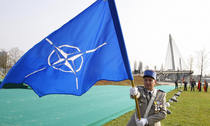 Right now I’m sitting at an event in Brussels to launch NATO’s new Strategic Concept, featuring ex-US Secretary of State Madeleine Allbright, the current and future NATO Secretaries-General, the senior NATO military commander, Admiral Stavridis, and 400 of NATO’s Best Friends Forever.
Right now I’m sitting at an event in Brussels to launch NATO’s new Strategic Concept, featuring ex-US Secretary of State Madeleine Allbright, the current and future NATO Secretaries-General, the senior NATO military commander, Admiral Stavridis, and 400 of NATO’s Best Friends Forever.
The Strategic Concept, what is that? It is the alliance’s main strategic document, meant to update NATO’s view on threats and challenges. The last one was agreed more than a decade ago.
But implementing out the new strategy isn’t going to be easy. The alliance is divided into at least three. Those who fret about Russia’s agressive behaviour. Those who think expeditionary operations are key. And, finally, those who belong in neither group. Members of the last contingent want to do as little as possible. They want to fight neither Russia nor the Taliban.
None of the three groups are investing heavily in new military capabilities nor the kinds of civilian instruments required for most kind of contingencies. Alexandra Vondra, the former Czech Europe minister, has just said he expected at least a 10 percent cut in NATO defence budgets over the next years.
But NATO faces other problems; the very process of updating NATO’s strategic plans comes across as the opposite of the new kind of politics that Barack Obama’s campaign seemed to usher in: participative, modern, and popular. This, by contrast, is a discussion between a lot of old, white, grey-haired men who have been talking to each other for the last twenty years.
When I raised the need to include the public in any discussions about NATO’s strategy to maintain popular support, Sir Lawrence Freeman ridiculed me from the podium. Twitter will not help us get an answer to what NATO is for, is roughly what he said. True (and a good put-down from the professor), but most Europeans are under 35 and a majority of women don’t know anything about NATO – and don’t care. Unless allied governments do something about that, keeping support for NATO’s operations – including those in the Hindu Kush – will be impossible.
With all these issues yet to be resolved, the new NATO chief, who has been sitting in the audience, has his work cut out for him. But if this is the last time you hear about NATO’s Strategic Concept, then Anders Fogh Rasmussen still has work to do.






Comments